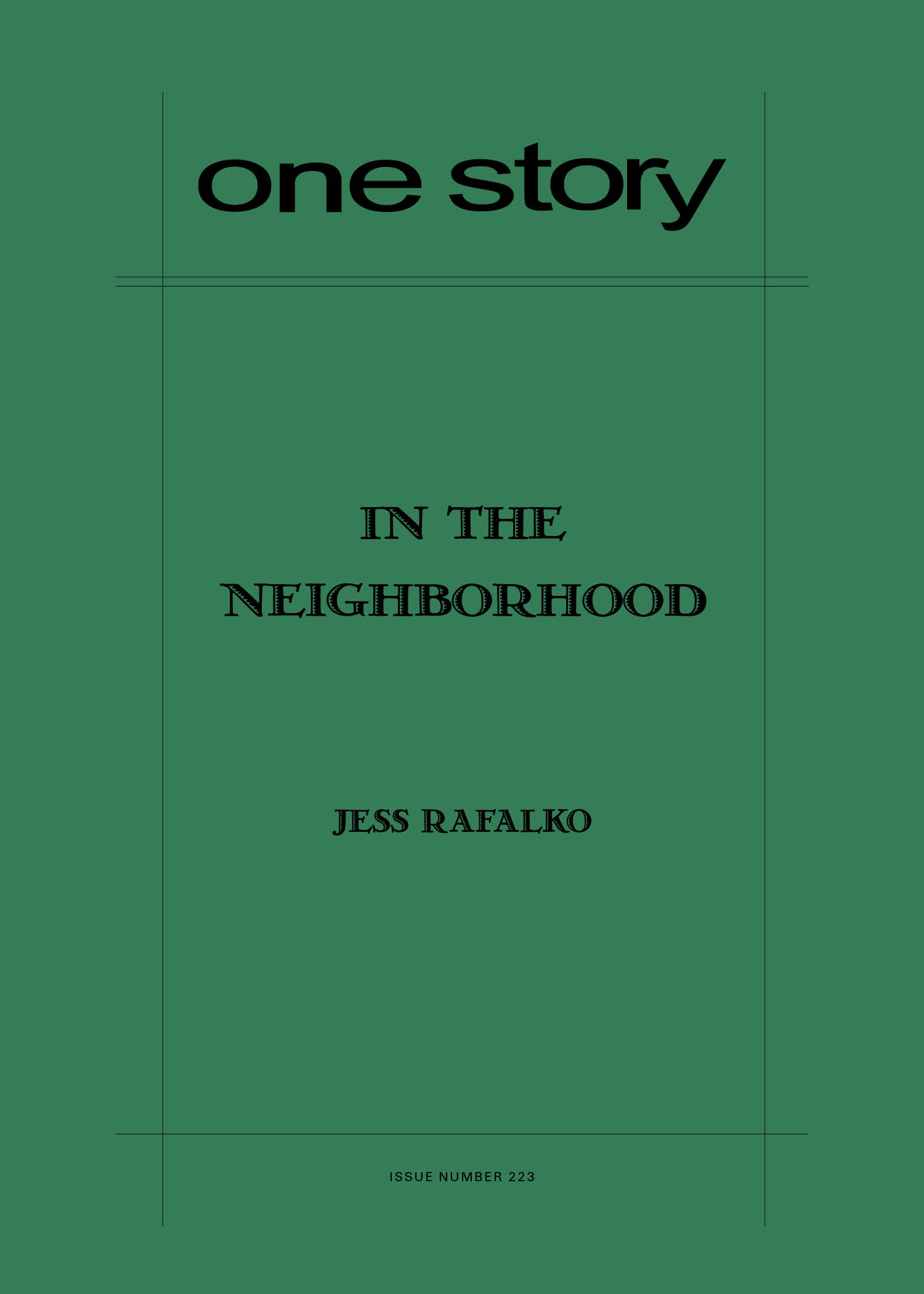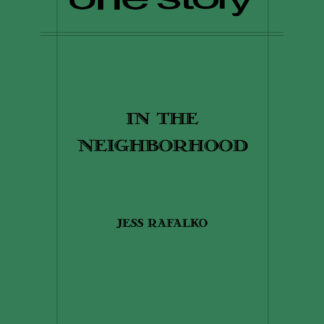
In the Neighborhood
$2.50
135 in stock
Excerpt
Hank thinks we have a bear problem.
“It’s the weirdest thing, Ange,” he tells me—standing at the kitchen sink, looking out the window. “The bird-feeder’s knocked down, and yesterday morning the garbage can looked like something’d been rooting through it.”
“You don’t say,” I murmur, pulling misshapen bits of dough from my bagel and dropping them on a napkin beside my plate.
“Yup,” says Hank. “Definitely a bear. How about that? Have you ever seen a bear in your life?”
“Yogi,” I say. “Pooh. That bear from The Jungle Book with that one song.”
Hank turns on the faucet and runs his eyeglasses under the stream of water. He puts them back on without drying them: when he turns toward me, his face looks like a windshield in bad weather.
“I guess that’s just a hazard of living in the mountains,” he says. “You’ve gotta contend with the wildlife.”
Jess Rafalko
Jess Rafalko lives in Columbus, OH, where she is an MFA candidate at The Ohio State University and serves as an associate fiction editor for The Journal. Her work has appeared in The Apple Valley Review, which awarded her its 2013 Editor’s Prize. A native of small-town Pennsylvania, she still receives the occasional text message from her parents about bears in the backyard.
Hannah Tinti on “In the Neighborhood”
Twenty years ago, I loaded everything I owned into a truck and moved from a quiet place in the woods to the middle of New York City. It took nearly a year before I understood how to navigate the different subway lines, got used to Indian, Ethiopian, and Egyptian food (the three staples in my neighborhood), and learned how to sleep through the sirens outside my window at night. There is a feeling of disorientation that comes with moving to a completely new landscape, especially when it coincides with a great emotional change, as it does for the characters in Jess Rafalko’s marvelous short story, “In the Neighborhood.” Angela and Hank are a married couple who’ve moved from the flatlands of Nebraska to the mountains of Vermont. They’ve unpacked and settled into new jobs, but the path of their journey is still strewn with wreckage. Hank is avoiding his grief and soldiering forward, while Angela has fallen into a well of guilt, anger, and sadness. Then, one day, a bear appears. The animal opens their mailbox, looking for food, and the scratches it leaves begin to tear down the walls that have built up between this husband and wife, who discover that moving to a new state may change the view from your window, but it will never change what’s in your heart. I hope you’ll all enjoy this story as much as our staff here at One Story did. And be sure to read Jess Rafalko’s Q&A with us, where she talks about work, love, loss, and the tornado that inspired this wonderfully moving story.
Q&A by Hannah Tinti
- HT: What was the seed of this story? What was the first thing you wrote?
- JR: A few years ago—around the time I was applying to MFA programs, and in desperate need of story ideas—I became mildly obsessed with bears; there had been a few recent sightings near my home, so they were on my mind. I had just written a story in which squirrels prominently figured (which is actually the piece I wound up sending to MFA programs), so maybe I thought I could achieve literary success by just working my way through the animal kingdom. Anyway, in that initial conception of the story, which I envisioned as a flash fiction piece, a father and daughter were staking out a bear one night...and that’s as far as I got. “Transcendental moment of identification with bear” and “mauling” were the two directions in which I supposed such a situation could pan out, but I never wrote a single sentence. That same summer, bears looming large in my brain and backyard, I heard a story from a co-worker about an acquaintance of hers from Texas. This woman had lived in a mobile home, and during a tornado sent her child to the neighbors’ house to ride out the storm. The mobile home remained intact, while the neighbors’ place was destroyed—and the woman’s child killed. I was disturbed by the fate of this child, the tragic irony of the story, but what interested me most was the woman herself: I wondered how she might deal with any sense of guilt over what had happened. So I had these two, seemingly unconnected ideas—which is actually my favorite place to be in, as a writer. My story-building process tends to involve the meshing of what I would call a situation (say, there’s a bear in the neighborhood) with an emotional state (say, grief over the loss of a child); from those jumping-off points, the relationships that can be explored (say, a husband and wife trying to support each other, or not, through this trauma they’ve just suffered) tend to become pretty clear, and once I have that combination of situation, emotion, and character I’m usually ready to begin writing. But I spend a lot of time working things out in my head before I actually go to the page, and it’s pretty tough for me to start if I don’t have a solid first line. And I guess I’m also pretty stubborn and resistant to change, because the first thing I wrote of “In the Neighborhood” is what remains the first line of the story: “Hank thinks we have a bear problem.”
- HT: In Nebraska, Angela was a nurse. But in Vermont, she works in a grocery store. How do these two jobs reflect her inner emotional state? Do you think she’ll ever get back to being a nurse again? Or is that part of her life over?
- JR: I’m very interested in what people do for a living. (Michelle Herman, a teacher of mine at Ohio State, once commented that one of the things she likes about my stories is that my characters always have jobs—which I think is just a product of my own middle-class, paycheck-to-paycheck upbringing, as well as my lifelong love of hearing the “work stories” of my parents and others.) Obviously so much of a person’s identity is tied up in their work—whether they construct their sense of self in harmony with their job, or in opposition to it—and so much of their time, on a practical level, is spent at work, so I always like to explore that aspect of my characters’ lives and allow it to inform the story in some way. With Angela—and this is something that emerged more as I worked on the story with One Story—her career path was tied up in this idea of “importance:” as a nurse, dealing with life and death, taking care of other people existed on somewhat equal footing with taking care of her family. And I think, in some ways, Angela sees the death of her son as an indictment from the universe of her dedication to her career—so, in Vermont, where Hank is making better money and they can afford the pay cut, Angela decides on a job that she herself deems “unimportant.” Which is flawed and problematic thinking, a product of her guilt and grief, but it’s where she finds herself at the start of the story. Though I hadn’t given this much thought before, I imagine Angela will continue working at the grocery store once the story ends, but hopefully find some sort of meaning in it (which she does at dinner, if facetiously, when she tells Jeff and Marie that she saves lives). I think that will just be part of the process of accepting her own loss, and this new life she and Hank are living in response to it. As a side-note—and this is the “bad writer” answer, because of course every choice in fiction is supposed to be made with the utmost intentionality— I’ll mention that Angela’s career trajectory was in part based on a woman I know who worked as a nurse and, upon her semi-retirement, took a similar sort of free-sample job. And my own mother is a nurse, so I liked giving her a bit of a shout-out, too.
- HT: The details you include about the tornado in Nebraska are chilling. Have you ever experienced one first-hand?
- JR: I actually have, even though I grew up in a small Pennsylvania town literally called “Mountain Top,” which is just about the last place (the top of a mountain!) where one would expect to encounter a tornado. It was a freak storm on the first day of December, and my mom (who tells this story so much better than I ever could) had taken me to the library to pick up some books. She sat in the car while I was inside, and she was listening to the radio when she heard a report of an oncoming tornado; when things seemed nearing a crisis point, she rushed me out of the library so we could get back to my little brother, who was at home by himself. So my mom and I actually found ourselves driving home in the tornado—the sky green, and roaring—and narrowly missed being struck by a huge tree that fell across our street, which we saw the next morning when we surveyed the damage to our neighborhood. Though we all made it through that storm unscathed, suffice it to say that some details of the experience definitely found their way to the finished story.
- HT: Hank and Angela are handling their grief in very different ways. What are their chances of making it in the long-run? Have you imagined their future, past this night?
- JR: I don’t want to speculate too much on the lives of the characters after the story, because I want readers to draw their own conclusions and imagine Hank and Angela’s future for themselves, but there is an odd (and inadvertent) sort of intersection with my real life that I could mention here. Last September, soon after I had completed the first draft of this story and workshopped it at Ohio State, my older brother died. So now, for better or worse, I kind of associate Hank and Angela’s navigation of the loss of their son with my own parents’. And from that vantage point, the handling of this particular brand of grief seems to go like this: you have good days and bad days, days where you know you love each other and days where you have to remind yourself of it, but once you realize you’re both on the same side then you can move toward acceptance, together. And I think Angela and Hank are approaching that realization at the end of the story—which readers can make of what they will.
- HT: What are you working on now?
- JR: I recently started working on a novel, which is about a fourth of the way finished right now. It began as a pretty straightforward family saga that was also, tangentially, about a local mayoral election—but now I find myself writing something that is more an even split between family saga and local mayoral election as microcosm of the 2016 presidential race. I’ve been thinking a lot about what it will mean to be a writer in the wake of this election, and attempting to process (rework, reimagine, reexamine) the events of the past 18 months in fiction has definitely been cathartic.
